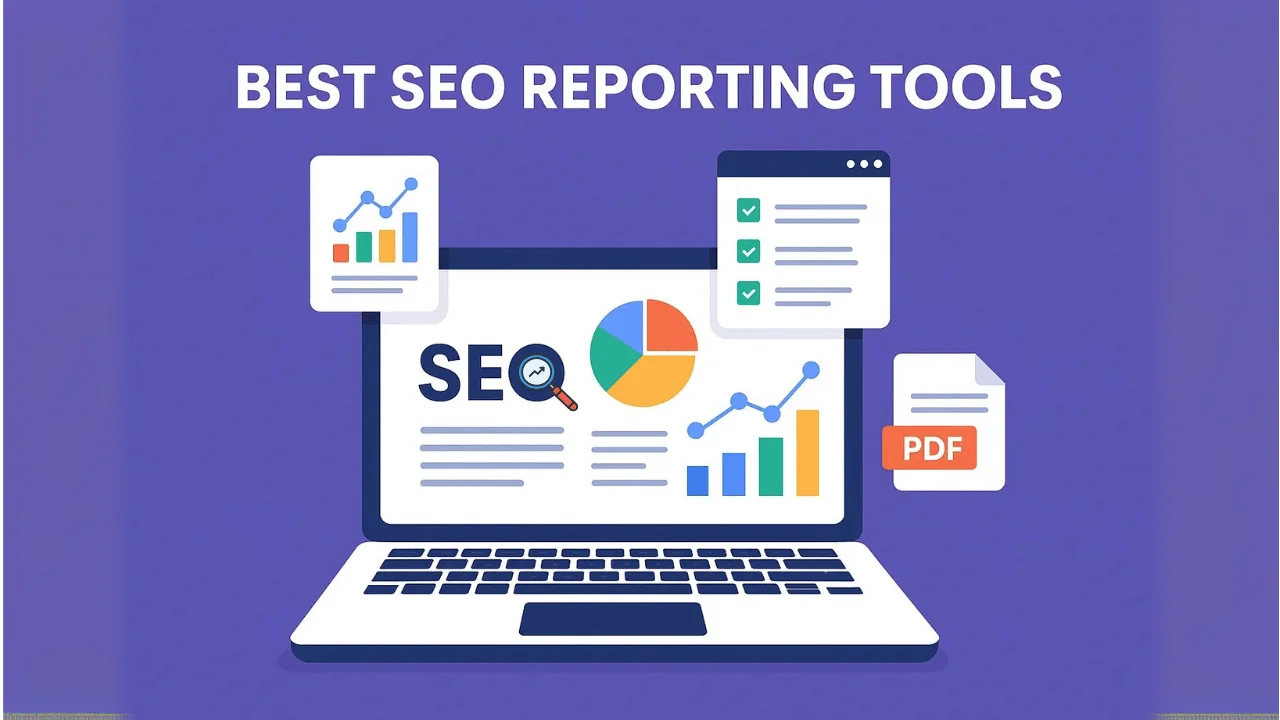In 2025, SEO reporting tools are more than just digital dashboards—they’re strategic assets for marketers, agencies, bloggers, and enterprise teams.
Whether you’re tracking keyword performance, automating client reports, or analyzing traffic sources, choosing the right tool can elevate your entire SEO strategy.
This guide explores the best free, paid, and white-label SEO reporting tools that simplify data, drive decisions and save time through automated workflows and insightful dashboards.
Table Of Contents
What Are SEO Reporting Tools and Why Do They Matter?

SEO reporting tools are platforms that collect, organize, and present data from your website’s SEO efforts.
Their core function is to generate meaningful SEO reports that help you understand what’s working and what needs improvement across various performance metrics.
Whether you’re tracking organic visibility, monitoring keyword rankings, auditing backlinks, or analyzing traffic sources, these tools simplify how you gather and interpret data.
Instead of manually checking separate analytics platforms, SEO reporting tools consolidate your insights into one clear view, making them essential for bloggers, agencies, and in-house marketers alike.
For example, tools like Google Analytics and Ahrefs provide detailed insights into site performance, user behaviour, and backlink profiles.
Platforms such as SEMrush go even further by combining keyword tracking, competitor analysis, and on-page audits into customizable reports.
In today’s fast-paced environment, using SEO reporting tools is not just about tracking rankings it’s about turning content performance metrics into strategic decisions.
When combined with digital marketing analytics, these tools help create a full picture of your site’s health, visibility, and conversion potential.
Key Features to Look for in an SEO Reporting Tool
Selecting the right SEO reporting tool isn’t just about what looks good on a dashboard—it’s about what empowers you to make data-driven decisions.
Whether you’re managing multiple clients, running your blog, or overseeing a corporate website, the right set of features can streamline your SEO efforts and enhance results.
To make your decision easier, here’s a breakdown of the most essential features every reliable tool should offer:
| Feature | Why It Matters |
|---|---|
| Data Integration | Ensure seamless access to platforms like Google Analytics, Google Search Console, Ahrefs, and paid ad networks. It brings all your SEO data into one place. |
| White-Label Reporting | Essential for agencies and freelancers who want to deliver professional-looking reports with custom branding, client logos, and branded dashboards. |
| KPI & Conversion Tracking | Go beyond traffic. Track goals, bounce rate, form submissions, and revenue metrics using integrated content performance data. |
| Automated Scheduling | Save time by setting up automated report delivery—daily, weekly, or monthly—to keep clients or teams consistently updated. |
| Flexible Report Formats | Choose from PDF downloads for archiving or Excel exports for custom editing and offline use. Helpful when collaborating or presenting. |
| Client Access Dashboards | Offer real-time visibility with shareable client dashboards or performance marketing dashboards—ideal for transparency and ongoing optimization. |
Each of these features is designed to support specific needs, from simplifying analytics to delivering high-quality insights at scale. .
Tools that combine these elements effectively are not just reporting systems they’re strategic SEO companions.
Best Paid SEO Reporting Tools in 2025
1. SEMrush
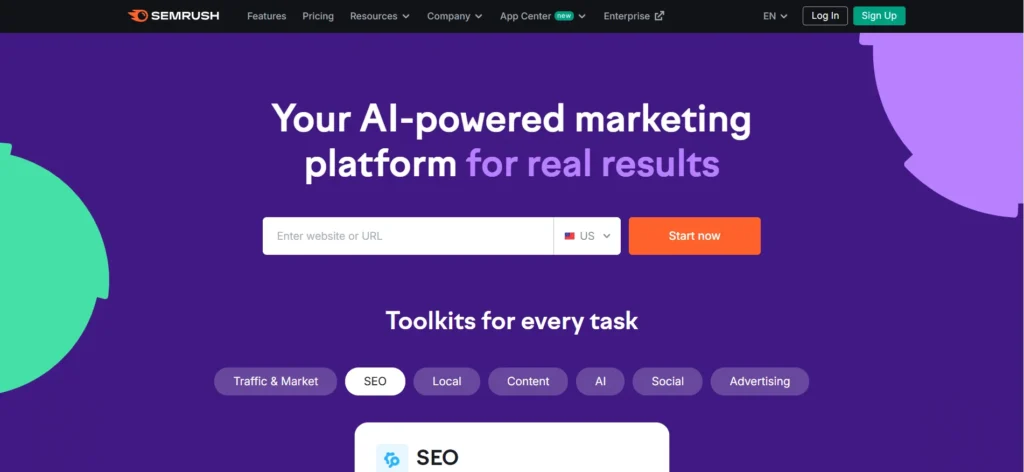
If you’re looking for an all-in-one SEO reporting tool that combines deep analytics with flexible reporting, SEMrush continues to be a top-tier choice in 2025.
It’s built for SEO professionals who want more than just keyword data—they want automation, custom dashboards, and actionable insights without jumping between platforms.
What Makes SEMrush Stand Out?
SEMrush offers an ecosystem of tools that feed directly into your SEO reports:
- Keyword Overview for ranking insights
- Site Audit to catch technical SEO issues
- Backlink Analytics to evaluate domain authority and link quality
- Position Tracking for monitoring real-time keyword performance
Each module integrates seamlessly into a custom reporting layout using drag-and-drop widgets, allowing you to personalize how data is displayed for clients or internal teams.
What’s especially impressive is SEMrush’s AI-generated report summaries.
These narratives explain performance shifts in plain language—ideal for clients who aren’t SEO-savvy or busy marketers who want clarity fast.
You can schedule reports to go out automatically, choosing delivery windows like daily, weekly, or monthly.
This makes client communication consistent and scalable, especially for agencies juggling multiple accounts.
Pros
- Covers everything from keyword tracking to backlink reports and technical SEO
- The report builder is intuitive and includes reusable templates.
- AI-generated summaries save time and enhance report comprehension.
- Supports automated delivery and branding for professional presentation
Cons
- The interface can feel overwhelming to beginners.
- Some advanced features require higher-tier plans.
- White-label reporting is not available in the basic Plan.
Pricing
- Pro Plan: $139.95/month
- Guru Plan: $249.95/month
- Business Plan: $499.95/month
Who Should Use SEMrush?
- Agencies needing rich SEO data and client dashboards
- In-house teams managing SEO campaigns at scale
- SEO consultants looking for AI-enhanced reporting and automation
2. Ahrefs
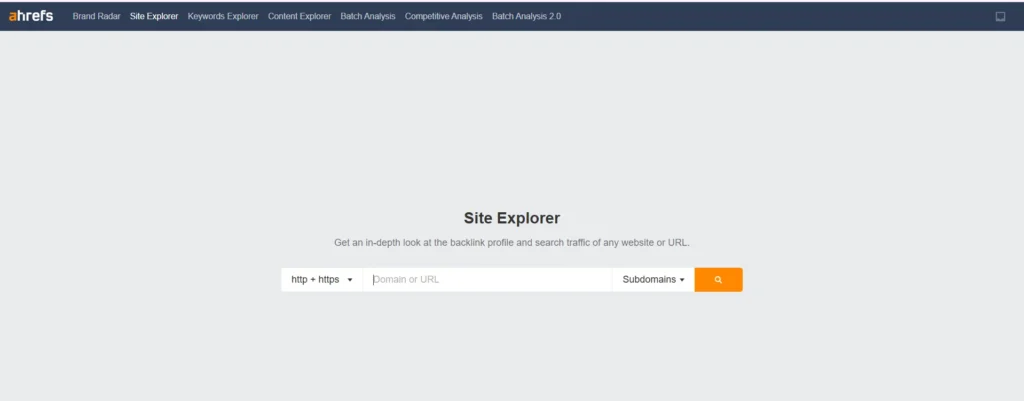
When it comes to backlink intelligence and technical SEO insights, Ahrefs continues to be one of the most trusted SEO reporting tools in 2025.
Its clean interface, rich data, and scalability make it a preferred choice for professionals who want reliable and accurate metrics to drive SEO decisions.
Why Ahrefs is a Powerful Reporting Tool
Ahrefs has built its reputation around its Backlink Explorer—arguably one of the most comprehensive backlink databases in the industry.
You can monitor referring domains, identify toxic links, and track link growth across competitors.
These detailed backlink reports are critical for agencies running link-building campaigns or auditing a site’s authority profile.
In addition to backlinks, Ahrefs offers Keyword Ranking tools that allow you to monitor keyword movements across mobile and desktop, segmented by country or region.
This is ideal for tracking SEO campaigns for clients in specific geographic markets or targeting Tier 1 countries.
Ahrefs also includes a robust Site Audit tool.
It scans your website for over 100 SEO issues ranging from crawlability and indexability to on-page content gaps and technical performance metrics. The technical SEO audit generated from Ahrefs is detailed, clear, and actionable.
Reports can be exported easily in PDF or CSV format, allowing you to customize deliverables for internal stakeholders or clients.
This export flexibility is especially useful for building slide decks or combining data with other SEO reporting templates in Excel.
Pros
- Industry-leading backlink database and in-depth competitor link analysis
- Real-time keyword tracking and multi-location SERP data
- Easy-to-read technical SEO audits with visual charts
- Supports PDF and CSV export for offline analysis or client presentations
Cons
- White-label reporting is limited unless integrated with external tools.
- No built-in client dashboards like some agency-focused platforms
- Requires some experience in interpreting advanced metrics effectively
Pricing
- Lite Plan: $129/month
- Standard Plan: $249/month
- Advanced Plans: $449/month
Who Should Use Ahrefs?
- Agencies focused on link-building strategies and technical audits.
- SEO freelancers who need trusted ranking data and export-ready reports
- Teams managing international SEO campaigns and domain comparisons
3. AgencyAnalytics
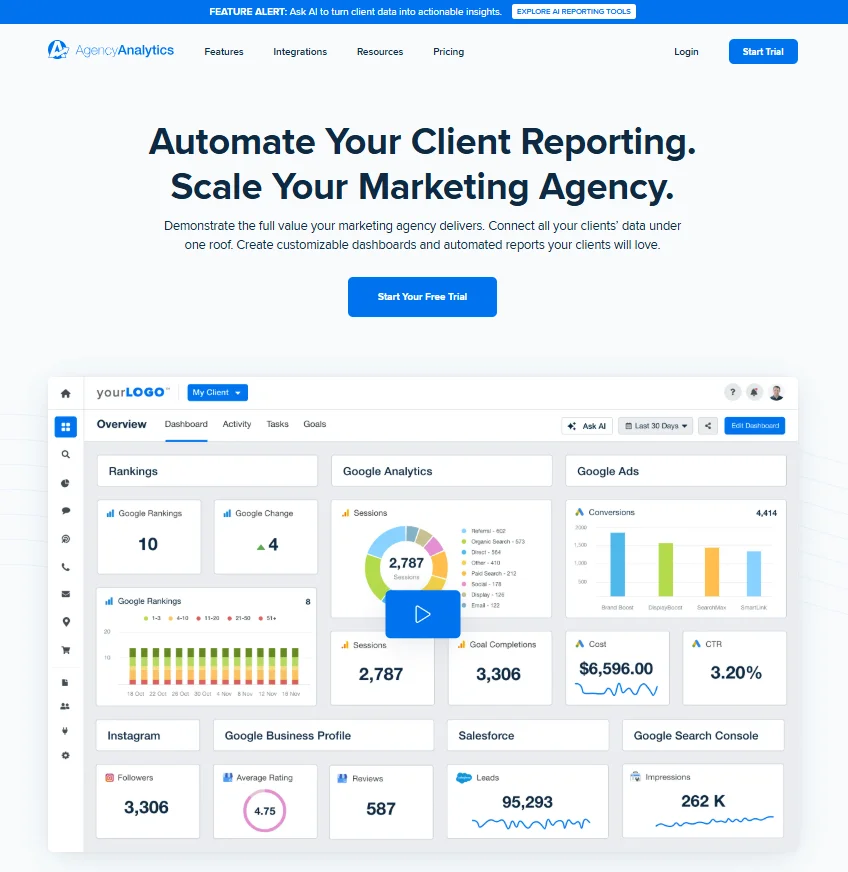
AgencyAnalytics is purpose-built for agencies and freelancers who manage multiple clients and need an efficient way to deliver white-labelled, professional SEO reports.
It’s not just another SEO reporting tool—it’s a complete client communication hub that helps agencies build trust and deliver results without the clutter of spreadsheets.
One of its standout strengths lies in its fully white-label dashboards.
You can add your branding, use a custom domain, and tailor the dashboard layout so clients feel like they’re inside your proprietary platform.
This feature alone makes it a go-to solution for digital marketing agencies that prioritize presentation and brand consistency.
AgencyAnalytics offers real-time client access, allowing users to log in anytime to view live SEO data.
This reduces back-and-forth communication and positions you as a transparent, data-driven partner.
Whether you’re tracking keyword rankings, backlinks, site health, or local SEO metrics, the platform displays insights in a clean and easy-to-understand format.
Its automation features are another major advantage.
You can schedule PDF reports to go out daily, weekly, or monthly, saving your team time while keeping clients informed.
Each report can be fully customized to include the metrics that matter most, whether that’s KPI tracking, traffic analysis, or conversion metrics.
Pros
- Fully branded white-label SEO reporting tool with custom domains and logos
- Automated PDF delivery and real-time dashboard access
- Integrates with 70+ platforms, including Google Analytics, Search Console, and Ahrefs
- Excellent client reporting dashboard with drag-and-drop modules
Cons
- Reporting depth may not match tools like SEMrush or Ahrefs for advanced SEO users.
- Some integrations require higher-tier plans.
- Custom branding is only available on agency plans.
Pricing
- Freelancer Plan: $79/month
- Agency Plan: $239/month
- Agency Pro: $497/month
Who Should Use:
It is best for digital agencies that want scalable white-label SEO reporting and client-facing dashboards with minimal manual effort.
4. DashThis
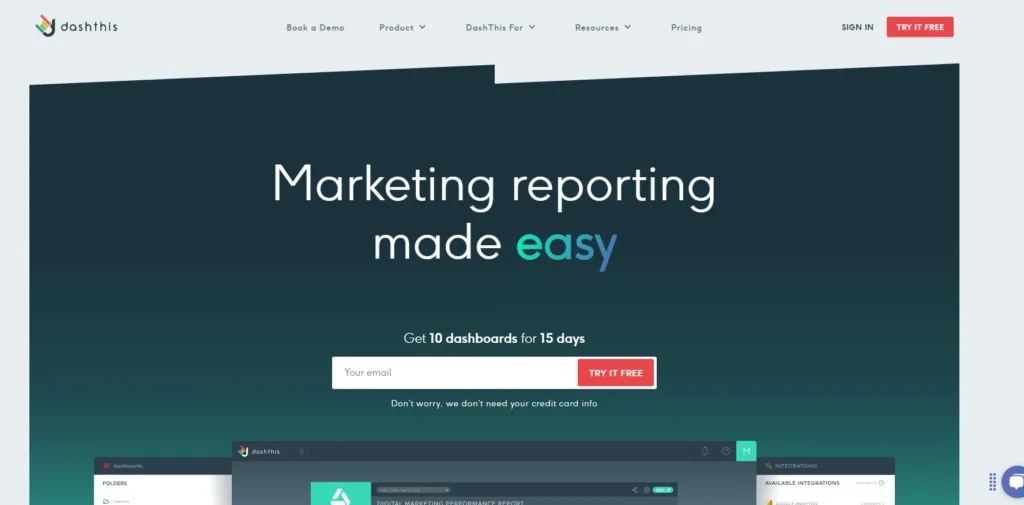
DashThis is another excellent SEO reporting tool built for marketers who want fast, flexible, and visually rich reports without technical hassle.
It’s ideal for SEO specialists, marketing teams, or agencies who manage performance marketing dashboards and want to minimize time spent on report creation.
The strength of DashThis lies in its custom report builder.
With just a few clicks, you can create reports using pre-set templates or fully customize layouts using drag-and-drop widgets.
Whether you want to highlight organic traffic trends, keyword rankings, or campaign ROI, the platform lets you arrange data the way you need it.
DashThis also supports real-time updates, so once a report is set up, it continues to update automatically without needing to be rebuilt.
Its template-based workflow streamlines reporting for recurring tasks, making it easy to duplicate and adjust reports for different clients or campaigns.
Collaboration is built into the platform, too.
You can generate shareable links, give stakeholders access to live dashboards, and even include notes for added context on campaign performance.
Reports can be exported in PDF format and scheduled to be delivered automatically.
Pros
- Highly visual and easy-to-use custom SEO report builder
- Time-saving real-time updates and reusable templates
- Integrates with 30+ tools, including Google Analytics, Search Console, and Ads platforms
- Great for agencies managing high client volume with limited reporting resources
Cons
- It doesn’t include built-in SEO tools (like audits or backlink data)
- It can feel limited for users who want deep SEO analysis beyond reporting.
- Advanced customization requires learning layout controls.
Pricing
- Individual Plan: $49/month
- Professional Plan: $159/month
- Business Plan: $309/month
- Standard: $479/month
Who Should Use:
It is ideal for freelancers or agencies who prioritize design-friendly reports and templated workflows for SEO and marketing performance.
5. Raven Tools
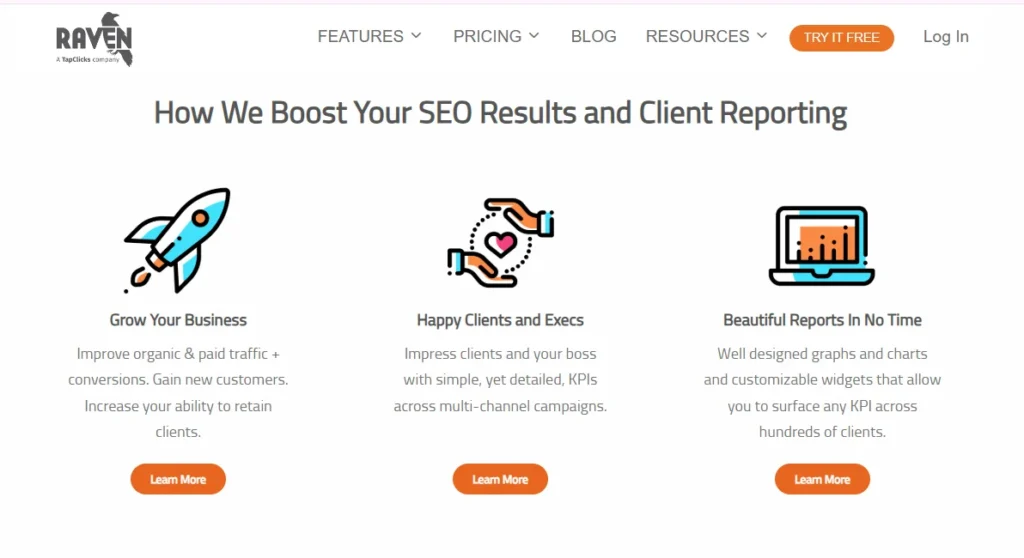
Raven Tools is a well-rounded SEO reporting tool that brings together SEO, PPC, and social media data into one unified platform.
It’s tailored for digital marketers and agencies who need comprehensive insights without juggling multiple tools or dashboards.
What makes Raven Tools particularly valuable is its ability to combine multiple marketing channels into a single customizable SEO report.
Whether you’re tracking Google Ads performance, monitoring keyword rankings, or auditing on-page SEO, Raven pulls it all together using integrated widgets and templates.
Its SEO audit feature is powerful and beginner-friendly.
It scans for technical issues like broken links, meta tag problems, and page speed bottlenecks, offering recommendations in a structured, readable format. You can also generate in-depth competitor reports that compare keyword visibility, backlink profiles, and domain metrics—ideal for spotting growth gaps or benchmarking performance.
One of Raven’s strengths lies in its white-label reporting capabilities.
You can apply your agency’s branding to both client dashboards and scheduled reports.
It also supports automated report delivery, so you can set your reporting frequency and let the tool handle the rest—whether it’s weekly summaries or monthly overviews.
Reports can be exported in PDF format or viewed online via shareable links, and they’re compatible with both technical and non-technical audiences.
While it may not offer the deep crawl data of tools like Ahrefs or SEMrush, it compensates with ease of use, clear layouts, and versatility across multiple channels.
Pros
- Supports multi-channel reporting: SEO, PPC, and social
- Easy-to-understand technical SEO audits
- Allows branded white-label reports and dashboards
- Good integration with Google Ads, Bing Ads, Facebook, and more
- Exports report in PDF and support the automated delivery.
Cons
- The interface is slightly dated compared to newer platforms.
- Limited backlink database compared to Ahrefs or SEMrush.
- Some users report a learning curve when setting up custom templates.
Pricing
- Small Biz Plan: $39/month
- Start Plan: $79/month
- Grow Plan: $139/month
- Thrive Plan: $249/month
- Lead Plan: $399/month
Who Should Use:
Recommended for marketing agencies and consultants who need all-in-one campaign reporting across SEO, PPC, and social media—with white-label delivery.
Top Free SEO Reporting Tools
1. Google Analytics 4 (GA4)
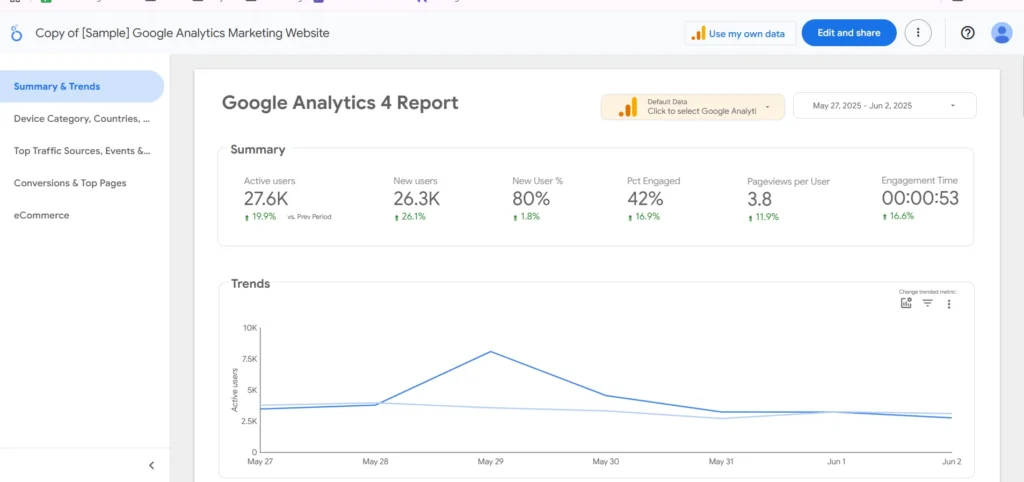
Google Analytics 4 is arguably the most widely used free SEO reporting tool available today—and for good reason.
It’s designed to help marketers, bloggers, and business owners understand how users interact with their websites and where their traffic is coming from.
In 2025, GA4 will become even more powerful with deeper insights, flexible tracking options, and built-in machine-learning capabilities.
Unlike its predecessor, GA4 is built around event-based tracking, which means it doesn’t just count pageviews—it records user interactions like video plays, clicks, scroll depth, and conversions.
This makes it easier to measure what actually matters to your business.
The platform shines when it comes to user behaviour analysis.
With real-time dashboards and custom segments, you can explore how users move through your website, which content holds their attention, and where they drop off.
GA4’s traffic segmentation capabilities let you filter by source, device, geography, and even engagement levels.
Another key strength of GA4 is its conversion tracking system.
Whether you’re tracking form submissions, purchases, or newsletter signups, you can define and monitor events that directly impact your bottom line—all without needing third-party plugins.
What also makes GA4 valuable for SEO professionals is its integration with Google Search Console, which allows you to merge traffic data with keyword performance and landing page visibility.
You can export data into Google Looker Studio for visual dashboards or into Excel for offline customization.
Pros
- 100% free and packed with advanced features
- Real-time insights into traffic behaviour and user journeys
- Seamless integration with Google Search Console and Looker Studio
- Custom conversion and event tracking to measure SEO effectiveness
- Data export options for use in SEO reporting templates or external dashboards
Cons
- The steep learning curve for beginners transitioning from Universal Analytics
- Some SEO-specific data requires connecting external platforms like GSC.
- The interface can feel unintuitive without prior experience.
Who Should Use GA4?
- Beginners and bloggers looking for a free SEO reporting tool.
- Marketers who want detailed traffic insights and content performance metrics
- Website owners who need reliable KPI tracking and conversion data
2. Google Looker Studio
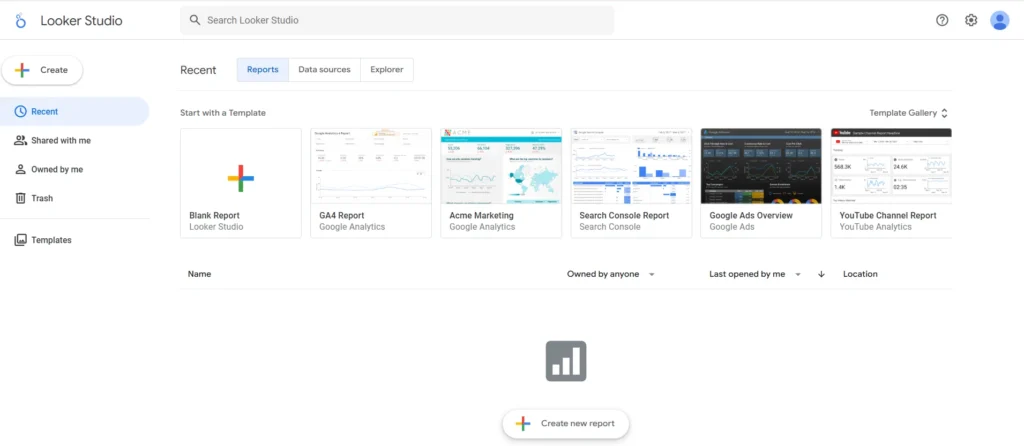
Google Looker Studio (formerly known as Google Data Studio) is a dynamic and highly customizable SEO reporting tool that’s ideal for marketers and SEO professionals who want to turn raw data into compelling visual dashboards.
It’s free to use and integrates seamlessly with platforms like Google Analytics, Google Search Console, and even third-party tools such as Ahrefs—making it one of the most versatile options for building data-driven reports.
What sets Looker Studio apart is its flexibility in creating custom dashboards.
You can choose from a library of pre-built templates or build your own from scratch using drag-and-drop widgets.
These dashboards can display traffic trends, keyword rankings, backlink metrics, and conversion data in a way that’s easy to read and client-friendly.
Report sharing is effortless.
Each dashboard can be shared via link or scheduled to be delivered to clients or team members in PDF format.
It also supports automated report updates, so once set up, your dashboards continue to pull live data without manual adjustments.
Whether you’re managing a single blog or reporting on hundreds of client accounts, Looker Studio offers a scalable way to visualize SEO performance metrics.
Its real power lies in connecting multiple data sources into a unified view and turning it into a branded, shareable, and interactive SEO report.
Pros
- It is completely free and integrates with major SEO and analytics platforms.
- Allows custom and white-label dashboards using logos and branding
- Supports real-time data updates and PDF exports
- It is ideal for agency reporting, especially when combined with SEO reporting templates.
Cons
- Requires some learning to build reports from scratch
- Not an SEO tool on its own—data depends on connected platforms
- Dashboard performance can slow with large datasets or complex visualizations
Who Should Use:
Perfect for freelancers, bloggers, and small agencies who need a free, flexible reporting tool with integration capabilities and interactive dashboards.
3. Screaming Frog SEO Spider
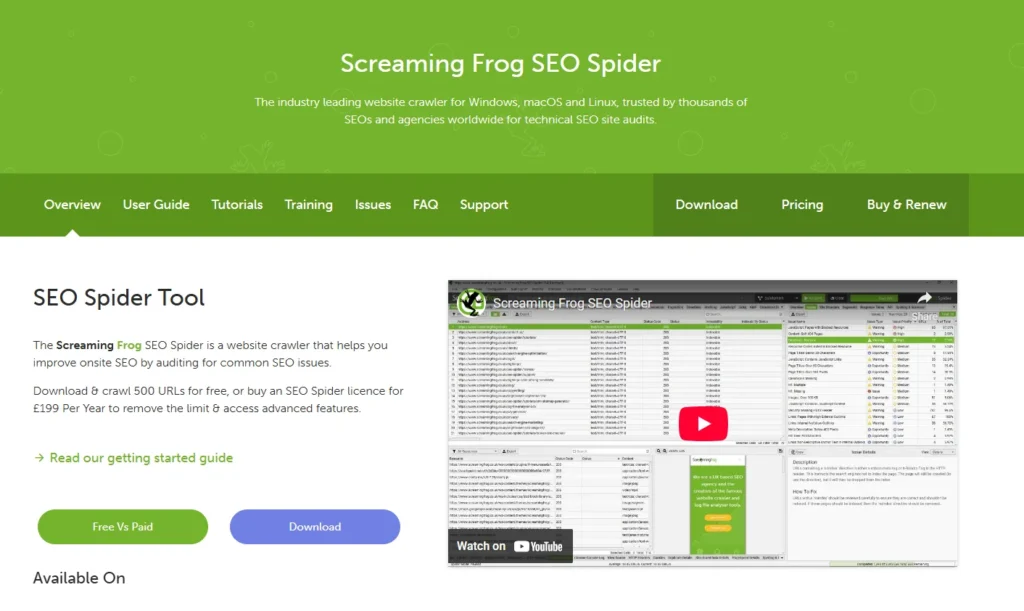
Screaming Frog SEO Spider is a desktop-based technical SEO audit tool used by SEOs to crawl websites and identify critical on-site issues.
While it’s not a full-suite SEO reporting tool like SEMrush or AgencyAnalytics, it plays a specialized role in producing technical SEO insights that are essential for improving site structure and performance.
The tool works by mimicking how search engines crawl your website.
It identifies broken links, duplicate content, missing tags, redirects, thin content, and even page load issues.
After crawling, the data can be exported into Excel format, allowing users to manipulate and review their findings using familiar spreadsheet tools or import the data into SEO reporting templates.
Screaming Frog is ideal for site audits during website migrations, penalty recovery, or regular SEO maintenance.
It’s especially valuable for agencies or consultants who need to deliver technical SEO reports to clients in a format that’s both detailed and actionable.
Pros
- Unmatched for in-depth technical SEO audits and crawl diagnostics
- Supports bulk exports in Excel, CSV, and other formats
- Allows advanced filters, custom crawl settings, and internal link analysis
- It helps uncover on-page issues that most cloud-based tools might miss.
Cons
- Limited free version (up to 500 URLs per crawl)
- No white-label dashboard or automated report delivery
- Interface may feel dated compared to cloud-based tools
Who Should Use:
It is ideal for SEO specialists and technical SEOs who want to perform in-depth audits and analyze crawl data to fix on-page issues.
4. Ahrefs Free Tools
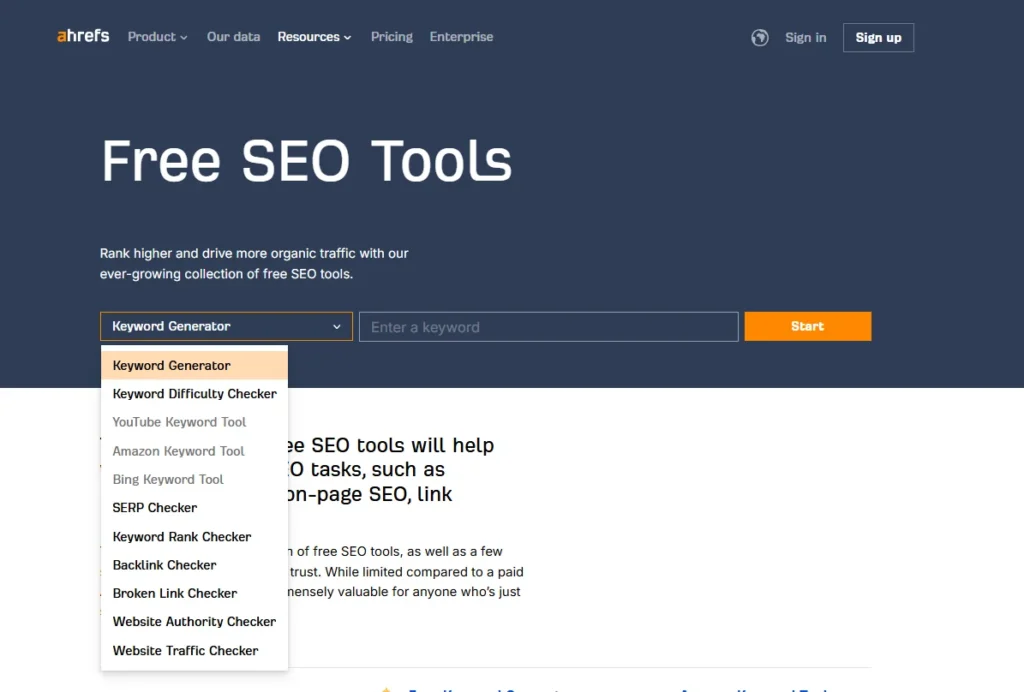
Ahrefs Free Tools offers a solid entry point into professional-grade SEO analytics.
It makes them a great choice for solo bloggers, beginners, and small business owners who want essential insights without paying upfront.
While the feature set is limited compared to Ahrefs‘ paid plans, these free tools still provide enough value to support foundational SEO efforts.
Two of the most popular free tools in this suite are the Keyword Generator and the Backlink Checker.
The Keyword Generator helps you discover high-potential search terms along with estimated search volume and keyword difficulty scores.
It’s especially useful for uncovering long-tail opportunities or building content clusters around low-competition phrases—ideal for small blogs targeting niche topics.
The Backlink Checker gives you a glimpse into your or your competitor’s backlink profile.
You can view the top 100 backlinks pointing to any domain or URL, along with key SEO metrics like Domain Rating (DR) and URL Rating (UR).
This helps new bloggers identify potential link-building opportunities or analyze how authoritative a site appears from an SEO perspective.
Despite being free, these tools carry the hallmark of Ahrefs’ trusted data quality.
However, they do come with usage limitations.
You won’t get access to full backlink history, advanced filters, or rank tracking.
But if your goal is to build a content roadmap or validate your off-page strategy, these tools can be an effective starting point.
For users who later need deeper reports, full site audits, and automated reporting, upgrading to a paid SEO reporting tool plan becomes the natural next step.
Pros
- No sign-up is required for basic use.
- High-quality keyword data with KD and volume insights
- View top backlinks and site authority metrics.
- Excellent for small bloggers and beginners testing SEO strategies
Cons
- Limited to top 100 backlinks and keyword suggestions
- No integration or automated SEO reporting options
- No custom dashboards or white-label features
Who Should Use Ahrefs Free Tools?
- Bloggers and website owners in the early SEO stages
- Content creators who need keyword validation and backlink samples
- Marketers seeking limited data before investing in full-featured SEO tools
SEO Reporting Templates (PDF, Excel & Visual Dashboards)
Templates are the foundation of scalable and consistent reporting.
Whether you’re creating reports for clients, stakeholders, or your review process, using a well-structured SEO reporting template can save hours of formatting while ensuring your data is always clear and actionable.
For marketers who prefer simplicity and offline access, an Excel SEO report template offers a clean, familiar format that you can download, customize, and reuse.
It’s particularly useful for monthly reporting, where you want to track key SEO metrics such as keyword rankings, traffic trends, backlink changes, and technical issues.
You can easily populate it with data from tools like Google Analytics, Search Console, and Ahrefs, then deliver it as a professional summary.
If you’re looking for more interactivity and real-time data, visual dashboards created with Google Looker Studio are ideal.
These dashboards pull live data from your connected sources and present it through graphs, tables, and widgets.
You can embed previews directly into a shared link or export them as a PDF report for client presentations.
These dashboards are especially helpful when branding is important—since they allow for custom colours, logos, and white-labelled URLs.
Whether you prefer static reports or dynamic views, templates allow you to focus on what matters most: interpreting the data and making smarter decisions.
Below, we offer a downloadable SEO report template in Excel format, along with a sample PDF report preview created in Looker Studio.
Both formats are easy to adapt based on your reporting frequency—weekly, monthly, or quarterly—and your audience type, from internal teams to external clients.
What’s Included in These Templates:
- Traffic breakdown by source and medium
- Keyword ranking summary
- Backlink overview with referring domains
- Site health insights from technical SEO audits
- Conversion tracking section for leads or sales
- Custom branding space for agency use
How to Choose the Right SEO Reporting Tool
Selecting the right SEO reporting tool depends entirely on your goals, the scale of your projects, and the kind of insights you need.
Whether you’re a solo blogger, a freelance SEO consultant, or managing campaigns for enterprise clients, aligning your toolset with your specific reporting needs is critical to delivering value and making informed decisions.
To help you choose effectively, here’s a decision-based breakdown that aligns reporting features with typical user roles.
This approach ensures you don’t overpay for advanced features you won’t use—or worse, miss out on crucial data that could influence performance outcomes.
1. For Freelancers: Google Looker Studio
If you’re handling a few projects and need custom dashboards without recurring costs, Looker Studio is a reliable option.
It lets you integrate data from Google Analytics, Search Console, and tools like Ahrefs, allowing you to create personalized reports.
Its visual interface, branded dashboards, and report-sharing features make it ideal for freelancers needing clarity and control without complex automation.
2. For Bloggers: Google Analytics + Search Console
For bloggers who want to track content visibility, Google Analytics (GA4) combined with Google Search Console (GSC) provides all the essential metrics—traffic sources, user behaviour, keyword rankings, and indexed page insights.
This combo helps measure performance without needing a third-party platform, and data can easily be exported into Excel or integrated into a reporting dashboard using free templates.
3. For Agencies: Raven Tools or AgencyAnalytics
Agencies require tools with strong white-label capabilities, automated reporting, and multi-client access.
Raven Tools offers multi-channel reporting, including SEO, PPC, and social analytics, in one dashboard, while AgencyAnalytics excels in real-time client access and custom branding.
These platforms are built for agencies that want to save time on reporting, improve client communication, and scale delivery efficiently.
4. For Enterprises: SEMrush or Ahrefs
When performance at scale matters, enterprise teams need robust SEO reporting platforms with integrated marketing automation, competitive research, and technical site audits.
SEMrush delivers detailed insights across all SEO dimensions with drag-and-drop reports and AI summaries.
Ahrefs, with its extensive backlink database and technical site audit features, is perfect for analyzing authority and refining off-page SEO strategy.
Both tools offer exportable PDF reports and advanced tracking for large-scale campaigns.
Each of these tools aligns with a specific user intent.
Choosing the right one involves identifying the reporting depth, integrations, and automation level you require—and then matching those needs to the platform that delivers the best functionality at your price point.
SEO Reporting Tools Comparison Table (Free vs Paid)
To help you choose the best SEO reporting tool for your goals and budget, we’ve put together a clear side-by-side comparison of popular free and paid platforms.
Whether you’re just starting or managing complex agency campaigns, this table highlights what each tool offers, who it’s best suited for, and whether it supports white-label reporting.
This overview simplifies the decision-making process by focusing on core features like data access, customization, reporting flexibility, and integration capabilities.
You’ll also find which tools support PDF exports, custom dashboards, or seamless connections with Google Analytics, Search Console, and platforms like Ahrefs or SEMrush.
| Tool Name | Free Version | Best For | White Label | Key Features |
|---|---|---|---|---|
| Google Analytics | ✅ | Beginners | ❌ | Traffic data, conversions, real-time behavior |
| Ahrefs | ✅ (limited) | Backlink research | ❌ | SERP tracking, keyword explorer, audits |
| SEMrush | ❌ | All-in-one SEO | ✅ | Rank tracking, backlink audits, AI reporting |
| DashThis | ❌ | Custom reporting | ✅ | Drag-and-drop builder, multi-source integration |
| Raven Tools | ❌ | Agencies | ✅ | SEO + PPC + social, multi-platform integration |
You can download a pre-filled Excel SEO reporting comparison template below to help evaluate or present these options to your team or clients.
The template includes editable columns for pricing, supported integrations, and notes—ideal for marketers comparing features side by side.
SEO Reporting Tools for Agencies and White-Label Branding
For digital marketing agencies, delivering clear, branded, and automated reports isn’t optional—it’s an essential part of the client experience.
The right SEO reporting tool not only simplifies data presentation but also reinforces your agency’s professionalism through white-label customization, custom dashboards, and consistent delivery.
Let’s explore how top tools like AgencyAnalytics, DashThis, and Raven Tools empower agencies to scale their reporting process and maintain brand consistency while doing it.
AgencyAnalytics: Full White-Label Control with Real-Time Dashboards
AgencyAnalytics is built specifically with agencies in mind.
It allows you to replace all default branding with your own—including logos, colours, and even a custom subdomain—so your clients see your agency name on every report and dashboard.
You can offer clients real-time access to dashboards, giving them 24/7 visibility into rankings, traffic, backlinks, and other KPIs without waiting for an email.
Reporting is fully automated.
You can schedule PDF reports to be delivered weekly, monthly, or at a custom interval.
Each report can include sections for keyword tracking, technical audits, site analytics, and conversion data tailored per client.
Use Case: A local SEO agency serving 30+ clients uses AgencyAnalytics to automate monthly reports with client branding and give each business a private login to its live dashboard.
DashThis: Visual Reporting and Fast Deployment for Agencies
DashThis excels in building visual dashboards and client-ready reports without a steep learning curve.
It supports full white-label features, including agency branding and shareable URLs. What sets DashThis apart is how quickly reports can be duplicated across clients.
If you manage multiple campaigns with similar KPIs, you can replicate a template and have a new branded dashboard ready in minutes.
Reports update in real-time and are automatically emailed in PDF format based on your schedule.
DashThis integrates with 30+ data sources, allowing agencies to combine SEO, social, and paid campaign metrics in one place.
Use Case: A content marketing agency creates a visual dashboard template in DashThis to track organic traffic, keyword positions, and blog conversions.
They clone this template for each new client and automate delivery every 15th of the month.
Raven Tools: Cross-Channel Reporting with Branded Presentation
Raven Tools merges SEO, PPC, and social media reporting into a unified platform.
It supports white-label PDF reporting, includes client dashboard access, and connects with platforms like Google Ads, Facebook, Bing, and more.
Its drag-and-drop report builder makes customization easy, and its multi-channel capabilities help agencies present a complete marketing picture.
Reports can be exported or scheduled, and its competitor comparison modules help agencies add value by showing measurable performance improvements.
Use Case: A full-service agency offers SEO + PPC packages.
They use Raven Tools to build cross-channel reports that highlight organic growth alongside ad performance, delivering white-labelled reports with custom cover pages and agency branding.
How to Automate SEO Reporting (Step-by-Step)
For marketers, freelancers, and agencies alike, time spent on repetitive tasks like compiling reports can quickly add up.
Fortunately, automating your SEO reporting not only saves time but ensures consistency, accuracy, and faster decision-making.
With the right SEO reporting tool, you can streamline your report scheduling and create a system that runs with minimal effort.
Here’s how to automate your SEO reports using a combination of Google Analytics 4 (GA4), Google Search Console (GSC), and SEMrush, all visualized through Google Looker Studio.
Step 1: Connect Your Data Sources to Looker Studio
Start by logging into Google Looker Studio and connecting the necessary data sources:
- For traffic and user behaviour, connect GA4.
- For keyword performance and page indexing, add Google Search Console.
- To enrich reports with backlink metrics, rank tracking, and competitive data, use the SEMrush connector (available via partner integrations).
Each data source will populate dynamic fields in your dashboard, such as organic traffic, top pages, CTR, bounce rate, referring domains, and keyword positions.
Step 2: Build Your SEO Dashboard
Using Looker Studio’s drag-and-drop interface, create a visual report that combines data from all sources.
You can build sections for:
- Organic performance trends
- Keyword ranking changes
- Top-performing landing pages
- Backlink growth
- Technical audit results from SEMrush
Customize your SEO report template with your branding to create a branded dashboard suitable for client presentations.
You can duplicate this template for each client or campaign and filter data based on their connected profiles.
Step 3: Set Up Automated Report Scheduling
Once your report is ready, click the “Share” menu in Looker Studio and choose Schedule email delivery.
Here, you can define:
- Recipients (clients, team members, stakeholders)
- Frequency (weekly, monthly, or custom)
- Format (automatically delivered as a PDF)
- Message body or report context
This ensures your reports are sent consistently, with no need to log in and manually export.
Step 4: Embed or Share the Dashboard
You can generate a shareable dashboard link or embed the report directly into a client portal or internal project hub.
This allows live access to real-time performance data without additional back-and-forth communication.
For additional guidance, you can refer to these official documentation pages:
- GA4 Integration with Looker Studio
- Schedule Report Delivery in Looker Studio
Use Cases by Audience – Bloggers, Agencies, Enterprises
The best SEO reporting tool isn’t the same for everyone.
The right solution depends on your workflow, the complexity of your campaigns, and how much control or automation you need.
Whether you’re a blogger looking for clarity, a freelancer managing a few clients, or a large enterprise needing in-depth insights, aligning your tool with your reporting goals is key.
Here’s a breakdown of the best SEO reporting tools based on audience type and typical needs:
| Audience | Suggested Tool | Why It Works |
|---|---|---|
| Blogger | Google Analytics + Search Console | Free, easy-to-use tools for monitoring organic traffic, keyword visibility, and page performance. Perfect for content-focused SEO strategies. |
| Freelancer | Looker Studio | Enables fully custom dashboards with integrations from GA4, GSC, or Ahrefs, and allows report scheduling with minimal setup. Great for independent consultants managing diverse clients. |
| Agency | AgencyAnalytics | Built for scalability. Offers white-label reports, client dashboards, and automated delivery—ideal for agencies managing multiple accounts. |
| Enterprise | SEMrush / Ahrefs | Provide comprehensive features including technical audits, rank tracking, backlink analysis, and multi-location reporting. These tools are suited for large-scale operations requiring enterprise-level SEO tools and marketing automation capabilities. |
Each of these tools aligns with unique reporting needs—from ease of access and visual storytelling to technical depth and multi-channel data integration.
By segmenting your options by audience type, it becomes easier to invest in a platform that delivers both the functionality and flexibility your SEO strategy demands.
Common SEO Reporting Mistakes to Avoid

Even with the best SEO reporting tools, mistakes in how you structure and deliver reports can dilute their impact or mislead clients and stakeholders.
High-quality reporting isn’t just about presenting data; it’s about showing the right data to the right audience at the right time.
Avoiding these common mistakes can significantly improve the clarity, usability, and strategic value of your SEO reports.
Overloading Reports with Irrelevant Metrics
A frequent issue is including every available metric from tools like Google Analytics, Ahrefs, or SEMrush, regardless of relevance.
While these platforms offer deep insights—from bounce rate and backlink growth to page speed scores—dumping them all into a single report can overwhelm the reader.
Focus on content performance metrics and KPIs that align with your campaign goals instead of flooding the report with vanity data.
Ignoring KPI Alignment
Your SEO report must reflect your key performance indicators.
If your goal is lead generation, then include conversion tracking and keyword rankings for high-intent pages.
If it’s visibility, then focus on impressions, click-through rates, and average position from Google Search Console.
Tools like Looker Studio and DashThis allow you to tie reporting widgets directly to campaign KPIs. When your data doesn’t match objectives, your report becomes noise instead of insight.
Lack of Custom Branding for Clients
Especially for agencies, sending out generic, unbranded PDFs or dashboards can hurt client trust.
Most modern white-label SEO reporting tools—like AgencyAnalytics and Raven Tools—allow you to apply your logo and brand colours and even use a custom subdomain for client dashboards.
Branded reporting reinforces your professionalism and makes it clear that you’re not just using generic templates.
Not Segmenting Data by Funnel Stage or Intent
Not all traffic is equal, and failing to break down metrics by audience intent or conversion funnel stages can hide critical insights.
Segment your data by branded vs. non-branded keywords, informational vs. transactional queries, or new vs. returning visitors.
Use GA4’s traffic segmentation features or customize dashboards in Looker Studio to reflect these views.
This helps stakeholders understand what type of traffic is driving results—not just how much.
When you avoid these mistakes, your reports become strategic assets instead of static documents.
They support decision-making, improve client satisfaction, and help justify the ROI of your SEO efforts.
Latest Trends in SEO Reporting Tools (2025 Outlook)
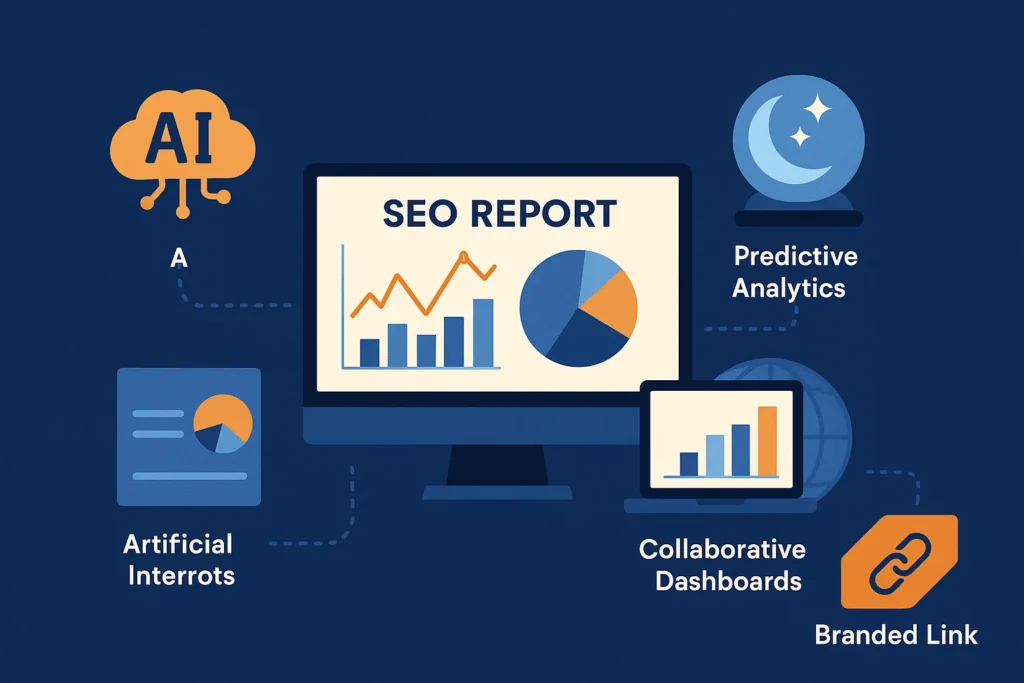
As SEO continues to evolve in complexity, the tools we use to track performance and communicate results are adapting rapidly.
In 2025, the focus has shifted from static metrics to dynamic, real-time, and AI-assisted reporting experiences.
Modern SEO reporting tools are no longer just data aggregators—they are now essential platforms for strategy, collaboration, and automation.
AI-Generated Reports: Smarter Summaries, Less Manual Work
Tools like SEMrush and DashThis are now offering AI-generated report summaries, which automatically interpret your data and highlight key takeaways.
Instead of spending time writing performance explanations, users can rely on AI to summarize keyword changes, backlink improvements, and traffic shifts in natural language.
This streamlines reporting and makes it easier for clients or internal teams to digest insights without needing technical SEO knowledge.
Predictive Analytics: Looking Ahead, Not Just Back
One of the most powerful trends in 2025 is the integration of predictive analytics into SEO dashboards.
Platforms like Looker Studio (via connected tools) and AgencyAnalytics are starting to incorporate trend forecasting to anticipate traffic fluctuations, ranking volatility, or content decay.
These insights help marketers prepare ahead of time rather than simply reacting to changes in the SERPs.
Predictive data is especially useful when tied to content performance metrics and historical campaign patterns, helping you decide which landing pages to update or which keywords to pursue next.
Real-Time, Collaborative Dashboards
In an age where distributed teams and remote clients are the norm, real-time SEO dashboards have become standard.
Tools like Looker Studio and Raven Tools support multi-user access, live data feeds, and embedded annotations for seamless collaboration.
These dashboards act as living reports that update automatically with connected data sources like Google Analytics, Search Console, and Ahrefs.
Having a real-time view of KPIs like conversions, organic traffic, and keyword movement empowers teams to respond faster to SEO challenges and opportunities.
Branded Link Delivery Over File Exports
While PDF reports and Excel templates are still widely used, many agencies and marketers are transitioning to branded shareable links for client reporting.
Instead of emailing static files, platforms like AgencyAnalytics and DashThis now let you generate custom URLs with white-labelled branding and interactive reports.
These links provide always-updated data, improve user experience, and reduce the need for frequent report versioning.
This shift supports a more modern client experience, particularly for agencies delivering SEO reports at scale.
Final Thoughts
Whether you’re a solo blogger using Google Analytics and Search Console or an agency scaling operations with AgencyAnalytics or SEMrush, the right SEO reporting tool can transform your workflow.
What once took hours of manual exports, formatting, and explanation can now be done with real-time dashboards, branded delivery, and AI-powered summaries.
The key to choosing the best platform lies in understanding your audience, campaign complexity, and reporting needs.
Tools that support automation, custom branding, and integration with multiple data sources give you a competitive advantage—not just in SEO execution but also in how you communicate value to clients or stakeholders.
Do you have a favourite SEO tool or a reporting workflow that works for you? Drop it in the comments—we’d love to hear how you’re making SEO reporting smarter in 2025.
FAQs – Choosing the Right SEO Reporting Tool (2025 Update)
How to do SEO reporting?
Use an SEO reporting tool like Looker Studio, GA4, or SEMrush to track traffic, rankings, and conversions. Set up templates and automate delivery to save time.
What is SEO and its tools?
SEO (Search Engine Optimization) improves your site’s visibility on search engines. Tools like Google Search Console, Ahrefs, and SEMrush help you track rankings, backlinks, and performance.
What is a monthly SEO report?
A monthly SEO report shows your site’s keyword rankings, organic traffic, backlinks, and conversions. It’s usually delivered via PDF or shared dashboard.
Which SEO tool is free?
Free SEO tools include Google Analytics, Search Console, Looker Studio, and Ahrefs Free Tools. They’re ideal for beginners or small sites.
What features make SEMrush and Ahrefs stand out?
SEMrush offers AI reports, rank tracking, and deep site audits. Ahrefs is known for its backlink data, keyword explorer, and technical SEO insights.
Can I create branded client-ready reports with SEO tools?
Yes. Tools like AgencyAnalytics, DashThis, and Raven Tools offer white-label reports with logos, custom domains, and automated delivery.
How do Google Analytics and GSC compare to paid tools?
GA4 and GSC give core SEO data for free. Paid tools like SEMrush and Ahrefs add advanced features like competitor tracking, audits, and reporting automation.
What are the latest trends in SEO reporting tools in 2025?
n 2025, SEO tools now offer AI-generated reports, predictive analytics, branded dashboard links, and real-time collaboration features.
Also Read:
- SEMrush vs SimilarWeb 2025 – Which SEO Tool Should You Use?
- Top Best SEO Audit Tools 2025 [In-Depth Review]
- 8 Best SEO Plugins For WordPress In 2025 For Top Rankings
